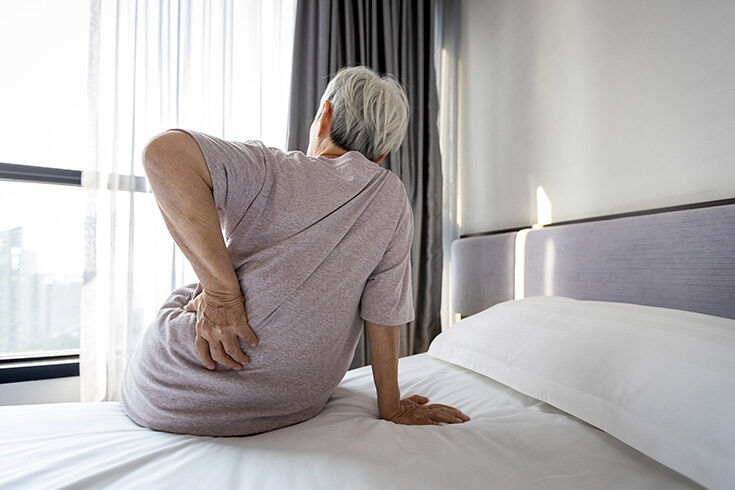A good night's sleep is vital for overall health and well-being, but for those suffering from hip pain, finding comfort in bed can feel impossible. Persistent aches and discomfort can make it hard to settle down, leading to restless nights, frequent awakenings, and a lingering sense of fatigue. Fortunately, memory foam mattresses offer a potential solution. Their unique properties can significantly alleviate hip pain, promoting more restful sleep and an improved quality of life.
How Hip Pain Affects Your Sleep Quality
Hip pain can arise from a variety of causes, including:
- Arthritis
- Bursitis
- Tendinitis
- Injuries
Regardless of the origin, hip pain can significantly impact your sleep. When you lie down, pressure on your hips can intensify the pain, making it challenging to find a comfortable position. This often results in:
- Frequent awakenings
- Reduced sleep duration
- Daytime fatigue
Your sleep posture can also worsen hip pain. For instance:
- Side sleepers might experience increased pressure on their hips.
- Stomach sleepers might put strain on their hip flexors.
Finding a mattress that supports proper alignment and minimizes pressure points is essential for anyone experiencing hip pain.
Alleviate Pressure Points for Better Hip Comfort
One of the primary ways memory foam mattresses help with hip pain is through pressure point relief. Traditional mattresses often create areas of concentrated pressure, particularly around the hips and shoulders. This can lead to increased pain and discomfort, especially for those with arthritis or other hip conditions.
Memory foam, in contrast, distributes your body weight evenly across its surface. This minimizes pressure on specific points, including your hips. The result? A more comfortable and pain-free sleep experience.
Experience Custom Contouring and Support for Your Hips
Memory foam is celebrated for its ability to conform to your unique body shape. As you lie down, the material gently molds around your curves, providing personalized support and cradling your hips. This contouring effect helps maintain proper spinal alignment, crucial for reducing stress on your joints and muscles. When your spine is in a neutral position, your body weight is distributed more evenly, further minimizing pressure on your hips.
Finding the right balance between softness and support is essential.
- A mattress that's too soft may not offer enough support.
- A mattress that's too firm can create new pressure points.
Sleep Undisturbed: How Motion Isolation Helps Your Hips
Sharing a bed shouldn’t mean sacrificing sleep. If you have a partner, their movements can disrupt your rest, especially when you’re dealing with hip pain. Memory foam mattresses excel in motion isolation - they absorb and minimize the transfer of movement across the bed.
This feature allows both you and your partner to move freely without disturbing each other. For hip pain sufferers, fewer sleep interruptions mean less tossing and turning, which can help reduce pain and stiffness.
Experience Custom Contouring and Support for Your Hips
Memory foam is celebrated for its ability to conform to your unique body shape. As you lie down, the material gently molds around your curves, providing personalized support and cradling your hips. This contouring effect helps maintain proper spinal alignment, crucial for reducing stress on your joints and muscles. When your spine is in a neutral position, your body weight is distributed more evenly, further minimizing pressure on your hips.
Finding the right balance between softness and support is essential.
- A mattress that's too soft may not offer enough support.
- A mattress that's too firm can create new pressure points.
Sleep Undisturbed: How Motion Isolation Helps Your Hips
Sharing a bed shouldn’t mean sacrificing sleep. If you have a partner, their movements can disrupt your rest, especially when you’re dealing with hip pain. Memory foam mattresses excel in motion isolation - they absorb and minimize the transfer of movement across the bed.
This feature allows both you and your partner to move freely without disturbing each other. For hip pain sufferers, fewer sleep interruptions mean less tossing and turning, which can help reduce pain and stiffness.
Select the Perfect Memory Foam Mattress for Your Hip Pain
Choosing the right memory foam mattress involves considering a few key factors to ensure optimal hip pain relief and comfort.
Find the Ideal Density and Firmness
Density: The density of memory foam refers to how much material is packed into a given space. It directly affects the mattress's feel and support.
- Higher density foam generally offers more support and durability, making it a good choice for those needing extra support for their hips.
- Lower density foam provides a softer, more conforming feel, which some people find more comfortable.
For hip pain relief, a medium to high-density foam is often recommended to provide adequate support without sacrificing comfort.
Firmness: Mattress firmness is another crucial factor to consider.
- Medium-firm mattresses strike a balance between support and pressure relief, making them a popular choice for hip pain sufferers. View our collection of the best mattresses for pressure relief.
- Soft mattresses may offer more contouring but might not provide enough support for proper spinal alignment.
- Firm mattresses can offer good support but may create pressure points if they don't contour enough.
Ultimately, the best firmness level will depend on your personal preferences and the severity of your hip pain. It's always recommended to try out different firmness levels before making a decision.
Determine the Best Thickness
Mattress thickness plays a role in providing adequate support and pressure relief, especially for side sleepers who tend to sink deeper into the mattress.
- Thicker mattresses (10-14 inches) generally offer more support and pressure relief, especially for heavier individuals or those with severe hip pain.
- Thinner mattresses (6-10 inches) can be suitable for lighter individuals or those who prefer a closer-to-the-ground feel.
Consider your body weight and the severity of your hip pain when choosing mattress thickness. A thicker mattress may provide more cushioning and support for your hips, leading to a more comfortable and pain-free sleep.
Explore Memory Foam Types
Memory foam technology has evolved, offering various options to cater to different needs and preferences.
- Traditional Memory Foam: This classic type of memory foam provides excellent pressure relief and contouring. However, it can retain heat, which might be uncomfortable for some sleepers.
- Gel-Infused Memory Foam: This type of memory foam incorporates cooling gel to help regulate temperature and dissipate heat, making it a good option for hot sleepers or those with arthritis. View our collection of the best cooling mattresses.
- Plant-Based Memory Foam: Made with natural materials like soy or castor oil, plant-based memory foam offers a more eco-friendly option while still providing the benefits of traditional memory foam.
- Open-Cell Memory Foam: This type of memory foam has a unique structure that promotes airflow and breathability, helping to keep you cool and comfortable throughout the night.
Consider your individual needs and preferences when choosing a memory foam type. If you tend to sleep hot, gel-infused mattresses or open-cell memory foam might be a good option. If you're looking for a more eco-friendly choice, consider plant-based memory foam.
By carefully considering these factors - density, firmness, thickness, and memory foam type - you can select a mattress that provides optimal support and comfort for your hips, leading to a more restful and pain-free sleep.
Optimize Your Sleep Position to Minimize Hip Pain
Your sleep position plays a significant role in managing hip pain. While the right mattress can offer support and pressure relief, adopting a proper sleep posture can further enhance your comfort and reduce discomfort.
Side Sleepers: Protect Your Hips with Proper Alignment
Side sleeping is a popular position, but it can put pressure on your hips if not done correctly. To maintain proper alignment and minimize hip pain:
- Place a pillow between your knees: This helps keep your hips, pelvis, and spine in a neutral position, reducing strain on your joints.
- Choose a mattress with adequate contouring: Memory foam's ability to conform to your body shape can provide excellent support and pressure relief for side sleepers.
- Consider a slightly softer mattress: A softer mattress can help cushion your hips and shoulders, preventing pressure points.
By following these tips, side sleepers can enjoy a more comfortable and pain-free sleep experience.
Back Sleepers: Support Your Spine to Relieve Hip Pressure
Back sleeping is generally considered a good position for spinal alignment, but it's important to ensure adequate support for your lower back and hips.
- Maintain a neutral spine: Avoid placing a pillow under your knees, as this can lead to misalignment and increased pressure on your lower back.
- Choose a mattress with good lumbar support: A mattress with reinforced support in the lower back area can help maintain the natural curve of your spine and reduce pressure on your hips.
- Consider a medium-firm mattress: A medium-firm mattress can provide the right balance of support and comfort for back sleepers with hip pain.
By prioritizing proper spinal alignment and lumbar support, back sleepers can minimize hip pain and enjoy a more restful sleep.
Stomach Sleepers: Safeguard Your Hips While Prone
Stomach sleeping can put strain on your neck and back, and it can also exacerbate hip pain. If you're a stomach sleeper and struggling with hip discomfort, consider these tips:
- Place a pillow under your pelvis: This can help reduce pressure on your hips and maintain a more neutral spine position.
- Choose a firmer mattress: A firmer mattress can prevent your hips from sinking too deeply, which can lead to misalignment and pain.
- Consider switching positions: If possible, try transitioning to side or back sleeping to minimize strain on your hips.
While stomach sleeping might not be the ideal position for hip pain sufferers, these adjustments can help make it more comfortable and supportive.
Address Common Memory Foam Concerns for Hip Pain Sufferers
While memory foam offers numerous benefits for hip pain relief, it's important to be aware of a few potential concerns and how to address them.
Stay Cool: Solutions for Heat Retention in Memory Foam
Traditional memory foam has a reputation for trapping heat, which can be uncomfortable for some sleepers, particularly those prone to overheating or night sweats. Fortunately, advancements in technology have led to cooler memory foam options.
- Cooling Technologies: Many memory foam mattresses now incorporate cooling technologies, such as gel infusions, open-cell structures, or phase change materials, to help dissipate heat and regulate temperature.
- Breathable Covers: Look for mattresses with breathable covers made from materials like cotton or bamboo, which promote airflow and enhance cooling.
- Sleeping Cool Tips: Consider using breathable sheets and bedding, keeping your bedroom cool, and avoiding heavy pajamas to further enhance your sleep environment.
With the right choices, you can enjoy the benefits of memory foam without sacrificing a cool and comfortable sleep.
Breathe Easy: Managing Off-Gassing and Odor
New memory foam mattresses may emit a temporary odor, often referred to as "off-gassing." This is caused by the release of volatile organic compounds (VOCs) during the manufacturing process. While the smell is usually harmless and dissipates within a few days, it can be bothersome for some individuals.
- Off-Gassing Process: The off-gassing process is typically most noticeable when you first unbox your new mattress. The smell should gradually diminish over time with proper ventilation.
- Minimizing Odor Concerns: Air out your new mattress in a well-ventilated room for a few days before sleeping on it. Consider using a mattress protector to further reduce odor transfer.
If you're sensitive to smells, look for memory foam mattresses made with CertiPUR-US® certified foam, which has low VOC emissions.
Move Freely: Overcoming the 'Stuck' Feeling in Memory Foam
Some people worry about feeling "stuck" in memory foam due to its conforming nature. However, modern memory foam mattresses are often designed with responsiveness in mind.
- Responsive Foam Options: Look for memory foam mattresses that incorporate newer technologies, such as plant-based or open-cell foam, which offer a more responsive and buoyant feel.
- Hybrid Mattresses: If you're concerned about feeling trapped, consider a hybrid mattress that combines memory foam with pocketed coils. The coils provide additional bounce and support, making it easier to move around.
Remember, memory foam technology is constantly evolving. There are many options available that prioritize both comfort and ease of movement. Don't let the fear of feeling "stuck" deter you from experiencing the potential benefits of memory foam for hip pain relief.
Consider Alternatives When Memory Foam Isn't the Answer
While memory foam is a popular choice for hip pain relief, it's not the only option. Some individuals may find other mattress types more suitable for their specific needs and preferences.
- If you prefer a firmer feel or sleep hot: Consider a hybrid mattress with a gel foam or pocketed coil base and a thinner memory foam comfort layer. This option offers a balance of support and pressure relief while promoting airflow for cooler sleep.
- If you're on a budget: Look into high-quality innerspring mattresses with a plush pillow top or a separate memory foam topper. This can provide a more affordable solution with decent support and pressure relief.
- If you're a combination sleeper: Explore gel foam mattresses, which offer a balance of contouring and responsiveness, making them suitable for various sleep positions.
Remember, the best mattress for hip pain is ultimately the one that feels most comfortable and supportive to you. Don't hesitate to explore different options and consider your individual needs and preferences.
Invest Wisely: Cost Considerations for Hip Pain Relief
Memory foam mattresses come in a wide range of prices, depending on factors like brand, size, quality, materials, and features. While it's tempting to opt for the cheapest option, investing in a quality mattress can offer significant long-term value.
- Price Range: Expect to pay anywhere from a few hundred to several thousand dollars for a good memory foam mattress.
- Long-Term Value: Consider the potential cost savings on pain medication, doctor visits, and lost productivity due to poor sleep. A quality mattress can be a worthwhile investment in your overall health and well-being.
- Sleep Quality ROI: Improved sleep quality can lead to increased energy, focus, and mood, enhancing your quality of life and making the investment even more valuable.
Remember, the most expensive mattress isn't necessarily the best one for you. Focus on finding a mattress that offers the features you need at a price that fits your budget.
Maintain Your Mattress for Long-Lasting Hip Pain Relief
Proper care and maintenance can extend the lifespan of your memory foam mattress and ensure it continues to provide optimal support and comfort for your hips.
- Rotate Regularly: Rotate your mattress every few months to prevent uneven wear and tear.
- Use a Mattress Protector: A protector safeguards your mattress from spills, stains, and allergens, helping to maintain its hygiene and longevity.
- Air it Out: Occasionally remove all bedding and allow your mattress to air out, which can help prevent moisture buildup and odor.
- Follow Manufacturer's Instructions: Refer to your mattress's care instructions for specific cleaning and maintenance recommendations.
With proper care, a quality memory foam mattress can last for several years, providing consistent support and relief for your hip pain.
Combine Memory Foam with Other Hip Pain Management Strategies
While a memory foam mattress can significantly improve your sleep and reduce hip pain, it's essential to adopt a holistic approach to pain management.
- Complementary Therapies: Consider incorporating physical therapy, massage, or heat/cold therapy into your routine to further alleviate pain and improve mobility.
- Lifestyle Changes: Maintain a healthy weight, exercise regularly, and practice good posture to reduce stress on your hips and joints.
- Consult Your Doctor: Discuss your hip pain with your healthcare provider to develop a comprehensive treatment plan that addresses your specific needs and concerns.
Remember, a good mattress is just one piece of the puzzle. By combining it with other pain management strategies, you can take a proactive approach to managing your hip pain and improving your overall quality of life.
Your Next Steps for Hip Pain Relief
If you're ready to experience the benefits of a memory foam mattress for hip pain relief, here are your next steps:
- Consult Your Healthcare Provider: Discuss your mattress needs and preferences with your doctor or physical therapist.
- Research and Compare: Explore different memory foam mattress options, paying attention to factors like density, firmness, thickness, and cooling technologies.
- Test It Out: Visit a Mancini’s Sleepworld mattress store location and try out different models. Pay attention to how your hips feel and whether the mattress provides adequate support and pressure relief.
- Read Reviews: Check online reviews from other hip pain sufferers to get insights into different mattress brands and models.
- Consider a Sleep Trial: Ask us about our sleep trials available for memory foam mattresses. Being able to try and return your mattress is a fantastic way to find one that offers the relief you seek.
- Make an Informed Decision: Choose a mattress that fits your budget, preferences, and specific hip pain needs.
Remember, investing in a good mattress is an investment in your health and well-being. Take the first step towards better sleep and reduced hip pain today!
Choosing the right mattress is a crucial step in managing your hip pain and improving your sleep quality. Remember to prioritize features like pressure relief, support, and comfort, and don't hesitate to seek expert advice.
Visit a Sleepworld Showroom: Our knowledgeable sleep experts can help you navigate the mattress selection process and find the perfect match for your unique needs.
Take Our Online Mattress Quiz: Not sure where to start? Our online mattress quiz can help narrow down your options and provide personalized recommendations.
Invest in your health and well-being. Take the next step towards better sleep with hip pain today.


